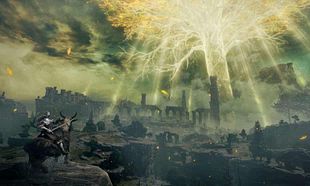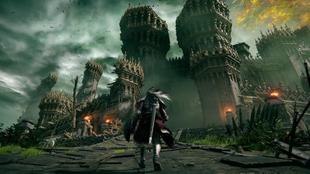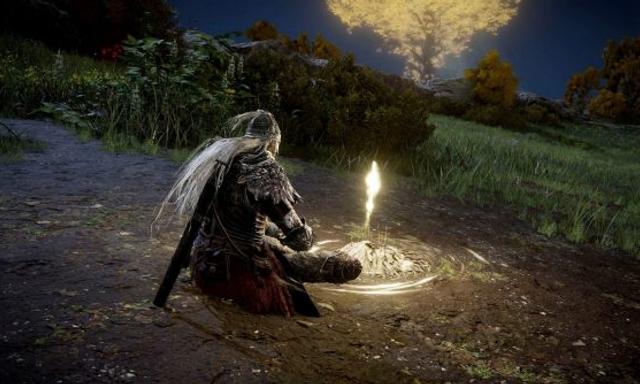How do you follow up a decade-defining masterwork such as ‘Dark Souls?’
In FromSoftware’s case, the answer was simple; make a game that expands upon what was already great.
‘Elden Ring’ is the Japanese developer's first major project since 2019's 'Sekiro: Shadows Die Twice' and have made a direct appeal to the mainstream with their latest effort.
'Elden Ring' is the culmination of all the work the developers have put in over the years.
‘Elden Ring’ is a miracle; it satisfies long-term fans of their games, while adding something fresh and new for players who want to see what the fuss is about.
From the word go, players are introduced to a dark and haunting world, this time with added input from George RR Martin.
In ‘The Beatles: Get Back’, the lads from Liverpool draft in Billy Preston to help solidify an idea, and the two different parties bring out the best in each other.
The same thing happens in ‘Elden Ring’: FromSoftware are The Beatles and George RR Martin is Billy Preston, and the end result is something for the ages.
Git Gud
FromSoftware have a reputation akin to that of Martin Scorsese or Hayao Miyazaki in the film sphere.
You know exactly what you’re getting when you buy a title from the Japanese developer, and in the case of ‘Elden Ring’, get ready to die within the first 10 minutes.
Players are introduced to a vivid, striking world, with Terry Gilliam-esque visuals, telling a story of an ancient, mystical world imbued with death, destruction, but an odd sense of hope.
You’re immediately thrust into a dungeon with no explanation and see messages on the ground from other players, warning of an impending threat.
You step outside and come across some strange horse/crab creature and die in 2 hits.
The now-iconic YOU DIED message floats across the screen when players are transported to another world and the game proper begins.
It’s an incredibly effective and ‘James Bond’ style way to open a game, and somehow, the game keeps topping itself.
After that, players are given free rein over an immaculately designed world full of strange creatures from the darkest recess of some designer’s mind, some stuffy lads on horseback, and merchants who want to help you on our way.

Bar the merchants and sheep, everything in the game world wants to kill you.
The combat in the ‘Souls’ games are now industry-standard (stamina management, knowing when to dodge, learning the enemies’ telegraphed moves) and ‘Elden Ring’ adds some further flourishes.
‘Elden Ring’ does a very clever thing in instilling a false sense of confidence and hope in the player.
Players can gleefully run around slaughtering NPC’s and creatures for their loot, but as soon as players come up against a boss monster, the bosses won’t hesitate to make you the imprint on their foot like an improvised Nike logo.
As for the boss monsters, some of the foes you come up against are instantly iconic, with one early game battle against a dragon in a swamp a particular stand out.
Yes, players will die over and over again, but there is always motivation to keep going and get the better of that infernal creature.
The combat in ‘Elden Ring’ is closest to ‘Dark Souls 3’ in terms of other FromSoftware games, but has added some new flourishes and wrinkles to keep players coming back.
Ringing Up
Despite the monstrous difficulty, ‘Elden Ring’ is a game that anyone can pick up and play.
Other reviewers have different views as to why the game is so appealing, but what we’ve nailed down is the game has the aura and atmosphere as something important.
The game projects confidence and pride in its world and environmental storytelling, and it tacitly invites players to come along for the ride.
Shortly after being made into mulch by the first real boss, the players see a gorgeous, glowing golden tree that serves as the centrepiece of the game world, and the game steadily conjures up one memorable image after another.
Seeing the ghostly outlines of other players running around also adds a surreal, dream-like quality to it, and the in-game messages from other players creates a communal sense of solidarity through suffering.
This was a feature present in other FromSoftware games, but the implementation of the online features in ‘Elden Ring’ helps create the feeling of never being alone in an oppressive, challenging world.
The game is mind-bogglingly huge, and its closest comparison is ‘The Legend Of Zelda: Breath Of The Wild’.
In terms of overall quality, it exceeds Zelda’s adventure on the Nintendo Switch.

The world of the Lands Between is rich, dense, and brimming with hours of content.
At Bethesda’s infamous 2011 E3 press conference, Todd Howard claimed that players could scale the mountain they saw far off in the distance.
This, of course, turned out to be snake oil and not possible with 2011 era technology, but over 10 years later FromSoftware has crafted a game world beyond all comparison.
‘Elden Ring’ creates a dense, rich and sprawling world that is begging to be explored.
Peaks and Valleys
In reviewing most games, critics wait for the moment when the game starts to lose them, and begin the process of death by a thousand cuts.
To give two recent examples, In ‘Horizon: Forbidden West’ it’s the repetitive, inane dialogue, in ‘Dying Light 2’ it’s the obnoxiously slow RPG progression.
When a game starts writing cheques it can’t cash, that is when the knives come out.
‘Elden Ring’ never drops the quality, and does the impossible – it gets better as it goes along.
If the game has any faults, the game isn’t terribly friendly to someone who hasn’t played other FromSoftware games before, but much like when we first played ‘Dark Souls’ all those years ago, this is a design choice that makes the developers unique.
The game doesn’t have a story in the traditional ‘approach a character and get a scripted CGI cutscene’ sense, instead choosing to let the players discover the story and game world at their own pace.
While this is something we’ve come to expect from the developer, it might be worth noting and consulting with the games Wiki page as you go along.

To be clear, this isn’t a hit on the game by any stretch of the imagination, but we are mindful of players who are looking to pick off the game based on a review or word-of-mouth.
With that bit of housekeeping taken care of, we are confident in saying this – ‘Elden Ring’ will go down as the game that will define the 2020s, much like how ‘Dark Souls’ defined the 2010s before it.
‘Elden Ring’ is sweeping and vast, and deserving of the term “epic”.
There is a mystical quality to the game we can’t quite put a finger on, but there is always an unheard siren song attracting players to explore and travel further into the games.
Very few games are capable of doing this, and ‘Elden Ring’ does an incredible job of making players want to come back for more.
Of course, you will die a lot, you’ll die enough times to fill Croke Park twice over, but with the loading times afforded to us with SSD’s, you’ll barely have enough time to reflect on your previous mistakes before you’re back in the heat of battle.
If you’ve ever had daydreams about braving a hostile land to defeat a monster, ‘Elden Ring’ is the game that fulfils those fantasies and then some.
For players who have loved and adored other games from the developer, be assured that ‘Elden Ring’ is the work of a developer at the very top of their game.
The closest comparison this writer can think of is David Lynch making his return to ‘Twin Peaks’ in 2017 and redefining what television could be as an artistic medium.
‘Twin Peaks: The Return’ is Lynch firing on all cylinders, paying tribute to all his old work while also showing off a cavalcade of incredibly imaginative and inspired sequences.
‘Elden Ring’ is the gaming analogue – that is to say, a landmark title in the history of the medium, something that challenges what the very notion of a video game can be, while still appealing to players of all stripes.
If ‘Elden Ring’ isn’t our game of the year come December, we are in for an extraordinary year.










































































